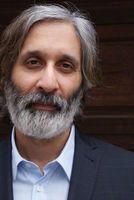Poet Ayaz Pirani on Oral Tradition, Literary Gatekeepers, and Writing Faithful Lines
Ayaz Pirani's work has been praised as "wise... surprising [and] sly" and his newest collection, Kabir’s Jacket Has a Thousand Pockets (Mawenzi House), builds on his characteristic insightful, elegant style.
Ranging from East Africa to Pakistan to India and beyond, Kabir's Jackets Has a Thousand Pockets is as unique as its title, exploring post-colonial longing and loss in a voice that brings to the page strength, wit, and deep intelligence.
We're excited to speak to Ayaz today as part of our Poets in Profile series, where we talk to poets about their new books, their first encounters with poetry, and their writing processes.
Ayaz tells us about how he discovered something unexpected when thinking about the first poem that really moved him, weighs in on whether the beginning or end of a poem is most important, and shares the best and worst parts of being a poet (his 'worst' will definitely give you a laugh!).
Open Book:
What is the first poem you remember being affected by?
Ayaz Pirani:
I thought the first poems I experienced were the ones I read. I remember giant anthologies behind a teacher’s desk and illustrated treasuries near the librarian’s elbow. Poems like "Rape of the Lock" and "On First Looking into Chapman’s Homer". Then I was reminded that the first poems I experienced were the ones I heard. My mother is a noted ginan singer, and in local jamats there certainly are masters of the craft. Of course not everyone has that special touch so there is a range in the experience. The ginans themselves are frankly incomparable. At the moment it seems impossible to try and explain how this oral tradition affected me.
OB:
Do you write poems individually and begin assembling collections from stand-alone pieces, or do you write with a view to putting together a collection from the beginning?
AP:
I started out writing individual, stand-alone poems and submitted them to literary journals. I thought after a while I would collect them as a manuscript. But the space in journals allotted to a poet like me is so small and intermittent, so cramped, that my poems couldn’t be open and true. Now I write manuscripts, I write books of poems. I hardly send out any poems until the manuscript is finished. I’m open to solicitation but I don’t spend time navigating the gatekeepers.
OB:
What do you do with a poem that just isn't working?
AP:
I pretty much start working on it again the next day. If I get going a bit, maybe 3-4 lines headway, I won’t give up. I’ll keep writing that poem. Sometimes I’ll see that I’m just rewriting a previous poem, or that as a consequence I’ve helped with another poem. Sometimes, you know, it’s just like a carcass and I pick at it for new poems. When I’m writing, I just keep writing and try not to make too many decisions.
Your CanLit News
Subscribe to Open Book’s newsletter to get local book events, literary content, writing tips, and more in your inbox
OB:
What's more important in your opinion: the way a poem opens or the way it ends?
AP:
I’m a bit afraid too much will be revealed about myself by answering that question. I think it’s a detail that would stand out in a novel five hundred pages long. But I do love a good ending. Think of how good Anne Sexton’s endings are in Live or Die or the way Keats ends his odes. Beginnings are more important of course, but endings break on the page and have the best chance to delight.
OB:
What was the last book of poetry you read that really knocked your socks off?
AP:
Transmitter and Receiver by Raoul Fernandes.
OB:
What is the best thing about being a poet... and what is the worst?
AP:
I suppose I enjoy spending my time doing "nothing". Try to imagine a kid in school with his notebook open but all the pages are covered in doodles. That’s my poetry practice. I don’t take it too seriously, I’m not trying to upend a wave or mend something broken. I stay on the level of syntax and try to make lines faithful to my thought.
The worst thing lately is when I tell someone my second book is coming out and they ask, "Is it also a book of poetry?"
_______________________________________
Ayaz Pirani was born in Musoma, Tanzania. He grew up in Canada, where he studied Humanities in Toronto and Montreal, and studied Fine Arts at Vermont College. He spends time between Canada and California.





